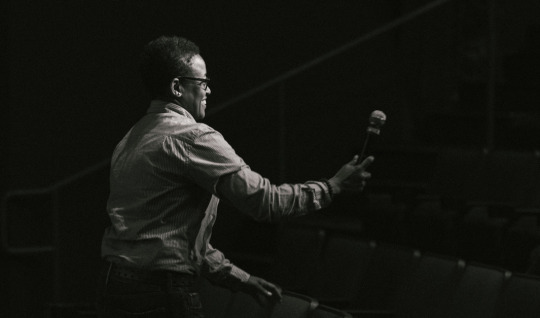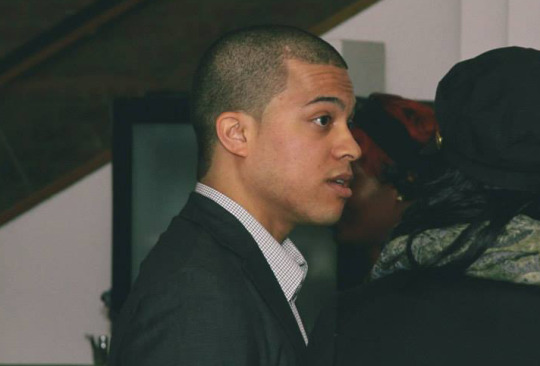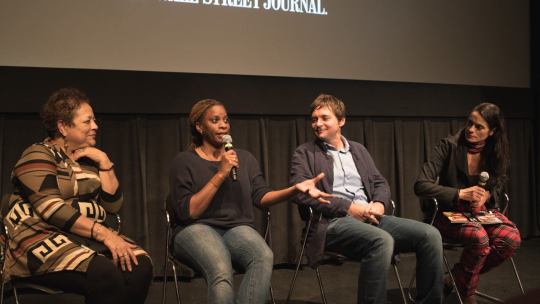#schermanfoundation
Explore tagged Tumblr posts
Text
Conversations | Meet ABI Business Caribbean Film Academy

Part of NYFA Arts Business Incubator’s first cohort, CaFA is increasing the visibility of Caribbean films and filmmakers in NYC and beyond.
Established in 2012, Caribbean Film Academy (CaFA) is a non-profit organization dedicated to the promotion and support of Caribbean filmmaking and filmmakers in the region and the Diaspora. CaFA’s work is focused on promoting and sharing the art of storytelling through film from the perspective of the Caribbean. The organization is part of NYFA’s Arts Business Incubator (ABI) program’s inaugural cohort, where they receive custom-tailored, formalized support from NYFA’s staff and network of experts to help them fully realize their mission. CaFA is also part of NYFA’s Fiscal Sponsorship program, which helps individual artists and emerging arts organizations optimize fundraising efforts.
We spoke with CaFA Co-Founders Romola Lucas and Justen Blaize at the close of National Caribbean-American Heritage Month to see what they’ve been up to, and what’s next for their growing business.

NYFA: What's the Caribbean film industry like in both the Caribbean and in New York? How'd you become interested in helping to support it?
Caribbean Film Academy: Overall, the Caribbean film industry can best be described as emerging, but depending on where you are, the “industry” is in different stages of development. The Spanish and French Caribbean are producing more films for the regional as well as global markets, than the English and Dutch Caribbean. The largest film festival dedicated specifically to Caribbean films is the Trinidad & Tobago Film Festival, and through the Festival and other local initiatives, Trinidad & Tobago has emerged as a leader in film in the English Caribbean.
With respect to New York, the picture is not as clear. The Caribbean arts and culture scene generally is becoming more and more vibrant through the activities of the dance, literary, cultural, and film organizations. With respect to film, it is difficult in many instances to identify the Caribbean filmmakers and actors in New York and the remainder of the Diaspora unless they themselves identify as Caribbean, since their work tends to be more reflective of the country they’re currently living in and not the Caribbean.
Having said that, through the work of our organization, we have created a year-round platform for anyone interested in the Caribbean film, by programming screening series and hosting filmmaker Q+As that raise the level of awareness of the existence of these films and filmmakers, growing an audience for them, and providing opportunities for filmmakers and viewers to interact and be of more support to each other.
We became interested in wanting to support the filmmakers, because we ourselves wanted to see Caribbean films. We were tired with the lack of diversity in cinemas in New York, showing mostly Hollywood films, and with the smaller, artsy venues, showing mostly foreign, as in European, films. We wanted to see films about our lives and cultures, see our stories, and hear our accents on the big screen. The Caribbean as whole is very diverse, but there are many similarities in the ways in which we live which can be shared through film, allowing people from different countries to learn about life in other countries they’ve never actually visited. We started off small, watching films with a few other people sharing this same interest at Nicholas Variety on Fulton Street in Brooklyn, and we have grown from there.
NYFA: Tell us more about the ways in which CaFA is increasing the visibility of Caribbean films and filmmakers. What're your key vehicles for promotion?
CaFA: We are doing this work in several different ways:
The Caribbean Film Series. Our signature program and an almost quarterly series where we bring 4/5 of the best in Caribbean films to screen per year at Brooklyn Academy of Music.
CaFA Cinema Nights. Where we started: our monthly screening series. It’s being held this year at the IFP Media Center in Brooklyn, where we present regularly-scheduled screenings of Caribbean films.
Third Horizon Caribbean Film Festival. A festival based in Miami that was started with a grant from the Knight Foundation in 2016 in partnership with Third Horizon Media to showcase the best in Caribbean cinema.
Timehri Film Festival. A Guyanese and Caribbean film festival we started in Guyana to provide a platform for Guyanese filmmakers, as well as to share films from other countries in the Caribbean, with Guyanese audiences.
Studio Anansi Tv. An online platform similar to Netflix that we created specifically for Caribbean films, to make them available to audiences worldwide.
Caribbean Film Project. A production program, through which we co-produce short films by emerging Caribbean writer/directors.

NYFA: What are some of the projects you're working on now? Did you do anything special to celebrate Caribbean-American Heritage Month?
CaFA: With our programming pretty much established, our projects are mostly internal and geared at growing the organization as a whole, as well as presenting individual programming.
We are currently rebuilding two of our websites, and will be working with a distributor to develop Studio Anansi into the go-to distribution company for Caribbean films, as well as working on partnerships in other countries to host film screenings and festivals in order to share Caribbean films more widely in the Caribbean, and in the United States, Canada, and England.
For Caribbean-American Heritage Month (CAHM) this year, we are hosting a special outdoor screening in Brooklyn’s Brower Park of a film adaptation of a short story by one of the Caribbean’s favorite authors, Earl Lovelace. The film, Joebell and America, by Asha Lovelace, is based on the short story by the same name, written by her father, Earl Lovelace. It is an immigrant story, speaking to the experiences of many Caribbean people living here in New York. We are partnering with Union Docs and the Luminal Theater to present this screening, which will be held tonight, June 28, at 7:00 PM.
NYFA: We don't want to put you on the spot...but do you have any favorite Caribbean films or filmmakers to recommend to our readers? Is there a film that would make a good introduction to the Caribbean film industry for the unfamiliar?
Ha. Now this is a tough one.
Some good contemporary films from the English Caribbean (not one, but a few 😊 ) are Children of God by Kareem Mortimer (the Bahamas), God Loves the Fighter by Damian Marcano (Trinidad & Tobago), Better Mus’ Come by Storm Saulter (Jamaica), Play the Devil by Maria Govan (the Bahamas), Ring di Alarm by the New Caribbean Cinema (Jamaica), Captureland by Nabil Elderkin (shot in Jamaica), The Sweetest Mango by HaMA Films (Antigua & Barbuda), Art Connect by Miquel Galofré (shot in Trinidad & Tobago), and Doubles with Slight Pepper by Ian Harnarine (Trinidad & Tobago).
These films cover a variety of stories, from LGBT to love, art, folklore, and music, and are generally stories of everyday life in the Caribbean, giving those unfamiliar with the “real” Caribbean, with life beyond the parties, white sand beaches, and blue waters, a good understanding of what it actually means to live in “paradise.”
Some good emerging filmmakers are Shaun Escayg from Trinidad & Tobago (Fish, Noka): Keeper of World’s), Chris Guinness from Trinidad & Tobago (Pothound, Capt T+T), Gabrielle Blackwood from Jamaica (Denis), Lisa Harewood from Barbados (Auntie), Mariel Brown from Trinidad & Tobago (Smallman: The World My Father Made), Jason Fitzroy Jeffers from Barbados (Papa Machete), and Vashti Anderson from Trinidad & Tobago (Moko Jumbie and Jeffrey’s Calypso).
These are some of the filmmakers are at the forefront of defining what it means to be a filmmaker in the Caribbean. They are using technology like VFX and animation and are not afraid to extend the bounds of their creativity in the context of the Caribbean in terms of style and the types of stories they are telling.

NYFA: What drew you to ABI? What's your experience been in the first year (now in the second year) of the program?
We were drawn to ABI by the opportunity to work behind the scenes, to make our organization sustainable. We started the organization and ran it all these years on our own, coming up with program ideas to fill the needs we found along the way, and figuring out which ideas would work best over the long term. With the resources NYFA has to offer, we hoped to be able to better organize and fund CaFA and put it on a path to sustainability.
We have had a fantastic experience in the program. The program’s coordinator, Peter Cobb, is an amazing resource and an avid supporter of the work we do. With the financial resources made available to us through the program, we were able to work with a consultant who helped us to organize our programming, develop our branding, and build our board, as well as develop a budget and fundraising plan for our activities. We were also able to work with a web developer to rebuild and customize our websites, bring on a person specifically dedicated to promoting our programs through social media, and begin development of an app to improve the online viewing experience for our subscribers. With NYFA’s organizational resources which were made available to us, we were able to network with other similarly situated organizations, get a mentor who is now actively supporting our efforts by becoming a member of our board, and gain further insight into successfully running an organization by participating in the workshops offered through the program.
NYFA: What's next for CaFA?
CaFA: On an organizational level, we will be getting our board up and running, and executing our fundraising plans to begin putting the organization on the sustainability track. On a programming level, we are working to grow our audience base to see greater attendance at screenings and festivals, as well as viewership online.
Our more long-term plans include creating a Caribbean film festival in New York, as well as building a facility to function as a co-working, event, performance, and exhibition space for Caribbean organizations working in dance, film, culture, literature, in the New York area.
Please visit our website to learn more about NYFA’s Arts Business Incubator program. Stay tuned for future posts featuring the members of the ABI cohort.
NYFA Fiscal Sponsorship’s next quarterly no-fee application deadlines are June 30 and September 30, and you can learn more about NYFA’s Fiscal Sponsorship program here. Read about other exciting projects utilizing sponsorship in our NYFA Fiscal Sponsorship Directory.
- Interview conducted by Amy Aronoff, Communications Officer
Images from top: Romola Lucas, Photo Credit: Justen Blaize; Justen Blaize, Photo Credit: Davone Alexis; audience cross section at the Caribbean Film Series, Brooklyn Academy of Music, Photo Credit: Justen Blaize; Filmmaker Q&A at the Caribbean Film Series, Brooklyn Academy of Music, Photo Credit: Justen Blaize
#artsbizinc#business of art#entrepreneurship#startups#abi#artsbusinessincubator#schermanfoundation#scherman foundation#CaFA#Caribbean Film Academy#NYFA Fiscal Sponsorship#NYFAFiscalSponsorship#amyaronoff#conversations#instagram
3 notes
·
View notes
Text
Meet ABI Business Blck Prism

Part of NYFA’s latest Arts Business Incubator (ABI) cohort, Blck Prism helps Black Millennials discover and invest in Black art.
Blck Prism is a re-imagined gallery space focused on empowering Black art through digital means. Founders Andre and Tanayia Woolery curate art from Black artists that represent a connection to Black culture and identity. Through engaging digital content and an accessible e-commerce platform, they help Millennials discover and invest in the art. We caught up with Andre and Tanayia to learn more about Blck Prism and their experience in NYFA’s Art Business Incubator Program.
NYFA: What opportunities are you seeing in the art market specific to Black millennials?
Blck Prism: We see an opportunity to shape a new generation of art collectors. Millennials are extreme consumers of visual content, but that isn't necessarily translating into art consumption. Currently the art world is inaccessible to the average consumer, and if we can present an experience where they feel comfortable becoming patrons then we have a major market opportunity. We're basing our business model on that of Def Jam Recordings in the 90's where consumption was at an all time high, fostered by the accessibility of CDs and marketing support from the televised content of MTV.
NYFA: How are millennials buying art in 2017, and how might their relationship to the market change as they get older?
BP: We see collecting as a progression. The initial engagement is actually in the mind, we first have to feel a connection to a piece. The next step is a digital collection within our social network feeds. When many of us are just starting our careers, we might be ready to incorporate art into our lives from a lifestyle perspective. This includes artful products at accessible price points, like a throw pillow or a phone case. At that time we're looking for ways to express our identity but we don't have as much disposable income. As we settle down with our families into more permanent residences we want to start collecting pieces. Finally, as our incomes rise and we're ready to start investing into original pieces and limited editions. Hopefully at that point, they would have invested time with Blck Prism to be aware of the artists or artwork they have fallen in love with over time. NYFA: What are the three sides to the prism in Blck Prism? Tell us more about Blck Prism's mechanisms for art discovery and experience.
BP: The three sides of the prism include art, content, and commerce. These three aspects are interconnected and fuel our entire ecosystem. At their core, Black art can be an expression of identity and a critical means for creating impact; content provides context so that we can create connection; and commerce enables the work to continue. NYFA: What's your curatorial process like for the site?
BP: We look for artists who want to take a non-traditional path. We want artists who are looking to connect to the community, not just the art world. We gravitate to visual creators who are storytellers. Blackness is a spectrum and it's critical that the full spectrum be represented. Initially we're looking for a well-rounded ensemble of characters not unlike hip-hop's Wu-Tang Clan. We want everyone to have a different style and persona that different people can connect to. NYFA: What drew you to ABI? What's your experience been like so far in the program?
BP: We've been slowly building the concept of Blck Prism for over two years. We were drawn to ABI because we wanted a jumpstart that an incubator provides. Our experience to date has been incredible. ABI has provided us with the time, space, and resources that we needed to kick off the business. We've also found great inspiration and collaboration in our cohorts. We can't thank [program coordinators] Peter Cobb and Natasha Zeta enough for the time, organization, and guidance they have given us. NYFA: What's next for Blck Prism?
BP: Next is a soft launch. We have an e-commerce platform built where we'll be selling a handful of products. We're currently building out the digital gallery space and actively recruiting Black artists. We want to start lean and optimize as we grow. We also acknowledge that we can't do this by ourselves, so we're looking for content creators, artists, and overall talented people to connect and build with us. To be notified of our launch, go to blckprism.com and enter your email!
Please visit our website to learn more about NYFA’s Arts Business Incubator program. Stay tuned for future posts featuring the latest ABI cohort.
- Interview conducted by Amy Aronoff, Communications Officer
Image: Courtesy Blck Prism
#artsbizinc#business of art#entrepreneruship#blck prism#startups#abi#artsbusinessincubator#scherman foundation#schermanfoundation#amy aronoff#instagram
6 notes
·
View notes
Text
Arts Business Incubator Intensive Recap: Doing Business Online

Get a legal perspective on doing business online from Elyse Dreyer, Compliance Counsel, Sotheby’s.
NYFA welcomed its second cohort of arts-based businesses to its Arts Business Incubator program this January, starting with 10 days of intensive training on legal, financial, and marketing topics related to growing a business. We were lucky to sit in on one of the training sessions, titled “Doing Business Online,” with Elyse Dreyer, SVP, Compliance and Business Integrity Counsel, Sotheby’s Americas and Lena J. Wong, Associate, Schindler Cohen & Hochman. Lena J. Wong kicked off the presentation with a hypothetical scenario that raised issues to think about when selling online.
Read on for session takeaways from Elyse Dreyer’s presentation, which delved into further details about the rules of engagement for online selling. If you’re already doing business online or if you’re thinking of taking the next step in growing your business, this post is for you!
Privacy Policy
Doing business online entails collecting information that’s considered private. Think credit card numbers, phone numbers, mailing addresses, and more. Do you have a privacy policy that tells people what data you’re gathering and how you’re using it? A privacy policy should incorporate your business’ perspective as well as the perspective of any third parties you may be employing or apps you may be using.
Transparency is key. Be as transparent as possible to let people know what you’re doing with their data. First, find out what data is being collected, then figure out what you’re doing with it. Take a look at Sotheby’s Privacy Policy as an example. If you update your policy, let people know in order to maintain transparency.
Longer isn’t necessarily better. Some courts or regulators might find issue with a 50-page privacy document. These days, courts are leaning towards shorter, straightforward policies without all the legalese.
Have a cookie policy. A cookie is a piece of data that is generated by a website and saved by your browser. Cookies are created not just by the website the user is browsing, but also by other websites that run ads, widgets, or other elements on the page being loaded. Read Sotheby’s Cookie Policy for more information.
Email Marketing
If you do not already, you should have an opt-out notice on all of your email marketing materials. It is a legal obligation to honor request to unsubscribe. Additionally, if you’re sending emails through third-party email providers, make sure you’re honoring their policies too.
Terms of Use
Beware of using copyrighted material on your website. For example: copyright in an image might belong to you, and the copyright in the art might belong to the artist. Check in with the rights and copyright holder; Sotheby’s largely talks to the Artist’s Rights Society to confirm what they can do with their images.
Consider Terms of Use as a means of protecting your intellectual property. Think about the use of your name and logo by external parties; Sotheby’s policy is to review any use for authorization. Click here to view Sotheby’s Terms of Use and to see additional examples of protecting your digital rights.
Online Sales and Payment
When selling online, disclose that extra costs may apply. For example, there may be added taxes, shipping costs, and custom duties. It is much more complicated to sell abroad, so research rules and regulations before deciding to open yourself up to that market. And finally, if you accept credit cards, make sure to know what the terms are with the processor and with the credit card company. Read all tedious agreements to save yourself trouble later on!
Additional Resources
New York State Bar Association Entertainment, Arts, and Sports Law has a list of resources on a variety of topics.
Volunteer Lawyers for the Arts provides arts-related legal aid and educational programming around legal and business issues that affect artists and arts organizations.
Lawyers Alliance for New York provides business and transactional legal services for nonprofit organizations that are improving the quality of life in NYC neighborhoods.
- Amy Aronoff, Communications Officer
ABI is made possible by the generous support of the Scherman Foundation’s Katherine S. and Axel G. Rosin Fund. For additional information on the ABI program, please contact [email protected].
Image from L to R: Elyse Dreyer and Lena Wong leading ABI’s “Doing Business Online” session, Photo Credit: Natasha Zeta.
#artsbizinc#business of art#entrepreneurship#startups#businessofart#abi#artsbusinessincubator#schermanfoundation#amyaronoff
1 note
·
View note
Text
Arts Business Incubator Program Welcomes New Cohort

Program helps support promising arts business start-ups through education, mentorship, and funding.
NYFA is pleased to announce the selection of the newest cohort for its Arts Business Incubator (ABI) Program, which provides NYC start-ups with intensive training in the fundamentals of starting and running an arts-based business, customized mentorship, and direct funding. The 18-month program will kick off on January 17 with 10 days of intensive training on legal, financial, and marketing topics and strategic, goal-minded methods for growing a business. Throughout the rest of the program, cohort members will receive custom-tailored, formalized support from NYFA staff and their network of experts.
This year’s cohort of six arts businesses were chosen based on their potential for creating jobs for artists, energizing diverse communities, and bringing art into the larger economy in dynamic ways. ABI, which welcomed its first group of cohorts in 2015, is made possible by the generous support of the Scherman Foundation’s Katherine S. and Axel G. Rosin Fund.
The new ABI cohort consists of the following six businesses:
BlckPrism: BlckPrism is an online destination that makes Black Art accessible to Millennial collectors through discovery, content, and e-Commerce.
CulturePass: CulturePass combines data science and the human touch of seasoned curators to personalize your monthly arts calendar. Subscribers receive handpicked tickets to arts and culture activities unique to their interests and delivered right to their door.
The Flying Squid: The Flying Squid is a company that produces multicultural and customizable storybook apps that allow children of any gender or race from all over the world to personalize the hero of the story to their liking -- including recording their own narration.
Program: {PROGRAM} is a digital zine that explores the intersection of art and emerging technology. To this end, {PROGRAM} couples artists and coders to create interactive and immersive editions of their work for touchscreen, virtual reality, and augmented reality.
Pryor Hill Productions: Pryor Hill Productions is a New York-based production company specializing in ethnically diverse long and short form content for film, TV, and digital platforms. Specifically they leverage their film/tv industry relationships and experience to break new talent and champion filmmakers of color who tell stories that are uniquely personal and relevant to a global audience.
Study Center: Artist Caroline Woolard, who has shown work at the Museum of Modern Art and is known because of documentaries about her work on PBS program Art:21, is making a consortium for artists who offer exercises in listening to corporate clients in half-day retreats.
For additional information on the ABI program, please contact [email protected].
Image: ABI Workshop, Photo Credit: Judy Cai
#artsbizinc#business of art#entrepreneurship#businessofart#startups#scherman foundation#schermanfoundation#abi#artsbusinessincubator#instagram
1 note
·
View note